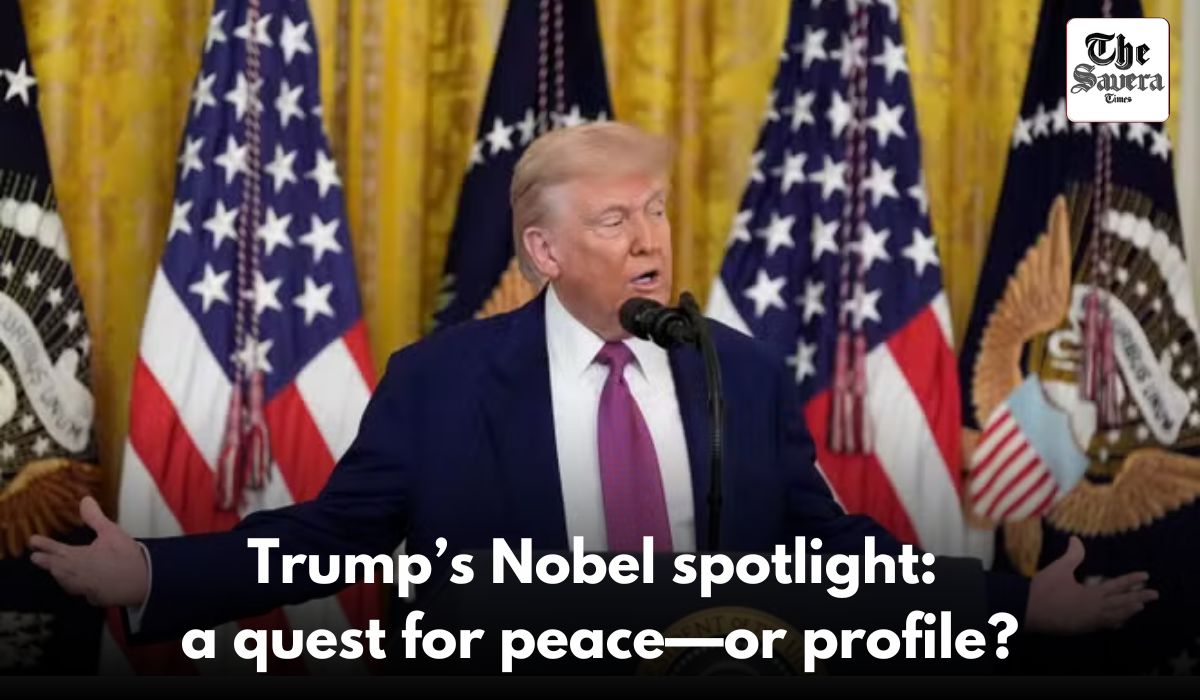
Former U.S. President Donald Trump has never hidden his ambition for recognition on the global stage, but few honours seem to captivate him as much as the Nobel Peace Prize. His recent lament on Truth Social — “I won’t get a Nobel Peace Prize no matter what I do” — underscores an enduring frustration that transcends politics and taps into personal legacy.
Trump’s post, filled with self-praise and grievance, listed a string of international developments he claims to have either influenced or directly engineered. These included a peace deal between Rwanda and the Democratic Republic of Congo, defusing tensions between India and Pakistan, brokering calm in the Serbia-Kosovo conflict, easing disputes between Egypt and Ethiopia over the Nile, initiating the Abraham Accords in West Asia, and allegedly playing a behindthe-scenes role in preventing full-blown war between Russia and Ukraine, and Israel and Iran.
Despite these claims, Trump remains convinced that he is being denied what he sees as his rightful place among Nobel laureates. “No matter what I do,” he posted, “I won’t get it. But the people know, and that’s all that matters to me.”
But observers suggest there’s more than public adulation at stake. Trump’s long-standing obsession with the Nobel Peace Prize appears deeply personal. His frequent references to Barack Obama’s win in 2009 — less than a year into the presidency — are often tinged with resentment. “If I were Obama,” Trump has said on multiple occasions, “I’d have had it in ten seconds.”
Even in closed-door discussions, he reportedly brings up Obama’s prize as a sore point. Former National Security Adviser John Bolton, who served briefly under Trump, once remarked that the ex-president’s fixation stems from his need to outdo his predecessor. “He saw Obama got it, and couldn’t understand why he shouldn’t,” Bolton said.
“For Trump, the prize is not about peace—it’s about prestige.” While Trump has been nominated for the Nobel Peace Prize several times — most recently by a law professor in Israel and previously by lawmakers in Europe and the U.S. — none have led to the honor. This hasn’t stopped his supporters from campaigning on his behalf.
U.S. officials and political allies, including Treasury Secretary Scott Bessent and Representatives Elise Stefanik and Mike Waltz, have all advocated for him, portraying Trump as a transformative global peacemaker. Pakistan has also joined the chorus. In an official statement, Islamabad announced it would nominate Trump for the 2026 Nobel Peace Prize, crediting him with “pivotal leadership” during a recent diplomatic flare-up between India and Pakistan.
Pakistani officials claim his intervention helped secure a ceasefire, preventing what could have become a dangerous escalation between two nuclear-armed nations. However, New Delhi has dismissed these assertions, stating that the understanding was reached through direct military-tomilitary channels, without outside involvement. Nonetheless, this endorsement has been touted by Trump and his team as validation.
For them, the nomination from a foreign government — even one viewed warily by parts of the American establishment — is a stepping stone toward greater recognition. But whether his actions match the Nobel Committee’s criteria remains in question. Analysts point out that the award has historically been given not merely for bold attempts or media-grabbing summits, but for sustained, verifiable efforts that lead to lasting peace.
Trump’s style — dramatic announcements, abrupt policy changes, and an emphasis on optics — may win headlines but rarely meets the measured standards of international diplomacy. The Abraham Accords, for instance, are frequently cited as one of his most significant foreign policy achievements. The agreements normalized diplomatic relations between Israel and several Arab nations including the UAE and Bahrain.
While undeniably historic, critics argue the accords were driven more by strategic convenience and economic incentives than a genuine resolution of long-standing conflict. Moreover, they failed to address the broader Israeli-Palestinian issue, limiting their long-term impact. Similar questions surround Trump’s touted role in the Congo-Rwanda deal.
While he announced a breakthrough and a planned treaty signing in Washington, details about the accord remain vague, and it’s unclear what role — if any — Trump played in facilitating the talks. Most experts believe the groundwork for the agreement was laid through African-led diplomacy. On Russia and Ukraine, Trump has positioned himself as a peacemakerin-waiting, often suggesting that he could end the war “within 24 hours” if elected again.
However, his critics argue that his perceived closeness with Russian President Vladimir Putin and inconsistent foreign policy record undermine his credibility. As one analyst noted, “Coercing or flattering autocrats isn’t diplomacy — and it won’t get you a Nobel.” Beyond the merits of his foreign policy claims lies a more symbolic truth.
Trump’s public pursuit of the Nobel Peace Prize speaks to a broader narrative he wants to craft — one of a disruptor who brought order, a dealmaker who delivered peace. It’s a cornerstone of how he hopes history will remember his presidency. Yet, that legacy remains contested. For every supporter who sees Trump as a misunderstood statesman, there is a critic who views his claims as inflated and his methods as unorthodox at best, damaging at worst.
With the 2026 nomination deadline approaching, Trump’s Nobel quest is far from over. But whether Oslo’s selectors will ever align with his vision is doubtful. In the end, Trump may not just be chasing a prize. He may be chasing validation — and a place in history that continues to elude him.
